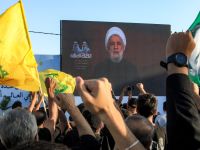Hong Kong police Saturday arrested 10 followers of the Falungong spiritual group who were staging a hunger strike in solidarity with 130 fellow members holding a similar protest in the Chinese mainland.
A police spokesman told AFP that the nine women and a man who were on hunger strike outside the Chinese government liaison office had been arrested for obstruction and detained in a police station.
The police gave them a verbal warning for obstructing the public minutes after they started their protest. But they did not heed the warning and were hauled into a police van, while still meditating sitting cross-legged.
Falungong spokeswoman Hui Yee-han told AFP that police had threatened the protesters with prosecution for obstruction after about 10 members started their indefinite protest Saturday by sitting on the pavement outside the liaison office.
She said police told the group that they were "obstructing the pavement" and were being a nuisance to pedestrians.
"The police warned us, saying that if we don't leave, they will prosecute us," she said.
The hunger strike in Hong Kong mirrors similar protests carried out outside the Chinese embassies in New York, Washington and London.
They were inspired by a group of some 130 followers held in Masanjia labor camp in northeast China's Liaoning province.
"The practitioners there have been on a hunger strike for three weeks after they were illegally detained and had their basic human rights violated," Hui said, adding that "they were close to death".
Meanwhile, another group of about 15 Falungong members staged a group practice session at the site where their fellow members were arrested hours earlier.
Police spokesman Inspector Mak Tze-kee said he had also given them a warning for obstruction.
Falungong combines Buddhist-based philosophy and slow-motion meditation exercises.
It was banned by the Chinese government in July 1999 in a move seen by many analysts as a sign top leaders feared its ability to mobilize vast numbers of protesters.
But the movement is still legal in Hong Kong which enjoys a large degree of autonomy from Beijing under the terms of the 1997 handover agreement which saw sovereignty transferred from Britain to China -- HONG KONG (AFP)
© 2001 Al Bawaba (www.albawaba.com)









